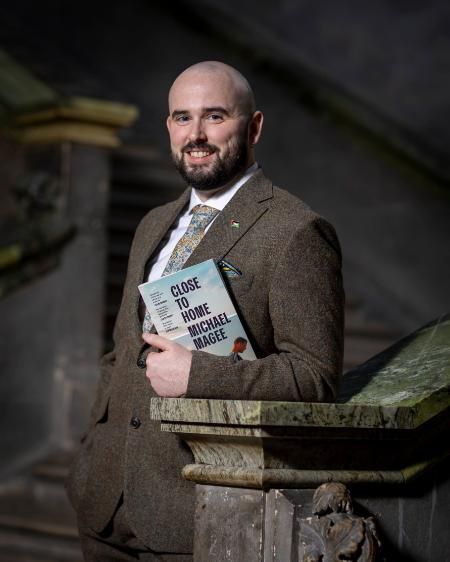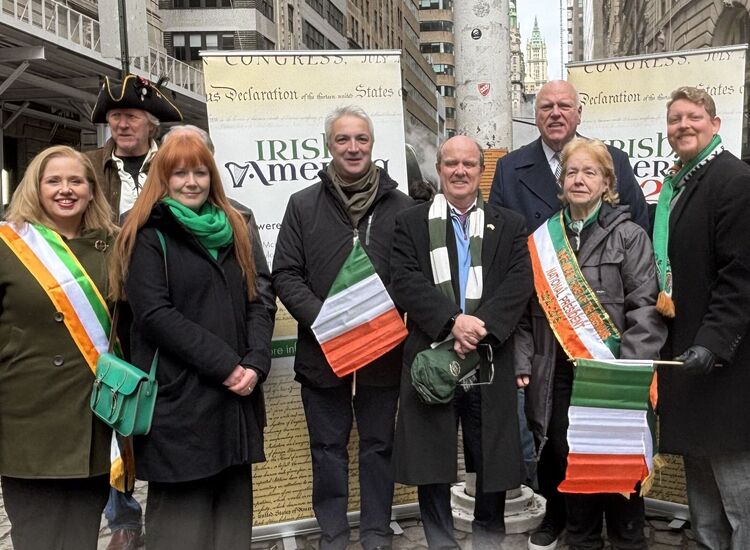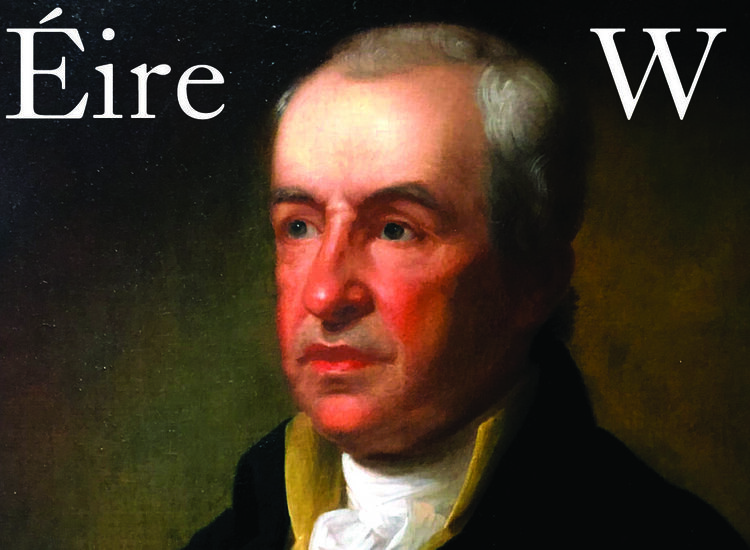ONE of the literary successes of 2023, Close To Home – the debut novel by Twinbrook writer Michael Magee – was greeted with critical acclaim on its release. Since then it has won the Rooney Prize for Literature, been named the Irish Book of the Year by Waterstones and has been shortlisted for several other awards. Then as the year drew to a close American actress Sarah Jessica Parker named the book among her best reads of 2023.
Set in 2008 during the economic crash, the story revolves around the main character Sean who has returned to Belfast from university in Liverpool, only to find opportunities limited in a city that is still coming out of conflict, and how that impacts on a young man trying to find his place in the world.
Sitting down with the author to reflect on an extraordinary year, Michael talks about the parallels between himself and Sean.
“It’s about a young man returning home from Liverpool, a young man who’s trying to escape his background in some way, who’s coming back and has fallen back into the environment that he was trying to get away from and then one night at a party he assaults this guy and does 200 hours of community service.
“And I think the story is about him trying to come to terms with that and himself, why he did what he did, and also trying to navigate a city that has been hit profoundly by this economic crash and also a city that is still carrying the shadow and the legacy of the Troubles and how those things intersect and shape who he is and where he is in his life.”
The economic crash of 2008 may have started with the banks, but when it had finished it had left behind a trail of devastation in communities, with people losing their jobs, their homes and relationships.
the fellas got a new jacket
grateful to @Waterstones, and to all the booksellers and buyers … Irish Book of The Year is some accolade
go raibh maith agat you pure stunners https://t.co/TX635I2x0Y pic.twitter.com/DkrlLJgRMa
— Michael Magee (@michaelmagee__) December 1, 2023
“I went to Liverpool in 2008 for uni and all my mates were tradesmen. I was probably the only person of my group of friends who went to uni and they were all joiners, plasterers and painters and I think within the year that I left a lot of them were laid off, a lot of them lost work, and so when I came back from Liverpool there was a feeling that their lives had been upended in some way and suddenly they didn’t have a trade anymore.
“They had to go to work in retail or call centres or whatever, or leave. So a lot of people went to Australia and most of my mates went to Australia. When I came back as well I had this degree and it was an English Literature/Creative Writing degree and I didn’t want to become a teacher but there wasn’t much in the way of opportunities.”
He added: “It was a time that I and people around me felt almost unmoored. You didn’t know where you were going. There was a degree of hopelessness. It was like, what else are we going to do? We might as well go and wreck the place, get drunk and take drugs and then I remember after coming down after a while and saying to myself that I’m straying here, I’m getting into a lot of trouble and I’m getting into fights a lot.”
Just like the character Sean in the novel, Michael got into a fight at a house party and had to do 200 hours of community service.
“I sort of look at the book and I sort of look at Sean and it’s almost like an alter ego or like another version of myself. The events and stuff around him – a lot of the stuff is personal, drawing a lot from my own experience like going to Liverpool, doing community service, living in a squat, being unemployed, all that kind of thing. So there is a lot of my story in it and a lot of the story of my family and my mother in particular. But I’ve sort of given myself a lot of leeway and that’s part of the process of writing it – I couldn’t write a straight memoir, I couldn’t write a straight autobiography, it felt too restrictive and I didn’t really know how to do it and the only way I knew how to tell stories was through being creative.
Mighty stuff - like being lifted above Black Mountain and looking down on the West in all its terrible beauty and heartbreaking humanity. @michaelmagee__ does with words what George Best did with a football. Close to Home had me in tears twice- here’s saddest paragraph of all. 🙌 pic.twitter.com/rlCAdnyyL8
— Máirtín Ó Muilleoir (@newbelfast) December 11, 2023
“You could say there is 90 per cent of me in it, or you could say there is 40 per cent; it’s somewhere in between.”
It took Michael five to six years to write the novel. He had written novels during his twenties but they went unpublished and didn’t see the light of day. He began writing Close To Home when he started a PhD at Queen’s University in Creative Writing. This time he knew it was different.
“I think in the past the big issue I had with trying to get published before was that I was worried too much about getting published – it was all about publication – that meant that I was producing working that hadn’t been worked on and I was just firing it out.
“So I just erased the idea of publication from my mind, even like when people came knocking and I had interest from agents – maybe three or four years into writing it – and I refused to show them it because this had to be ready for me first. I think that that was really important to spend the time thinking, writing and working on it. It was like, if you do the work publication will come hopefully.”
When the book was finished it went to auction with eight leading publishing houses bidding for it. Michael said he couldn’t believe the reaction.
“When it came out it was amazing, I had a brilliant party and had all my mates there and then the first month was very busy and I was doing a lot of publicity and I was travelling and that was very tiring. I don’t think I’ve wrapped my head around it. I know it's done well and I know that it’s resonating with a lot of people and that’s class.”
And why has it resonated with so many people around the world?
besties pic.twitter.com/MbN2X1FC5y
— Michael Magee (@michaelmagee__) December 11, 2023
“Fundamentally, maybe I’ve written a good story and that’s enough in a way,” he says.
“It took me a long time to learn this as a writer, a part of me thought that you had to generalise a bit or to make the writing translatable to someone living in London or wherever, but I think the opposite is true.
“I think that all the best books that I read and all the best pieces of literature are very specific to the place that they are writing about and the society that they’re writing about and that’s what good literature does. It’s about an individual in a particular society at a particular moment and how you sort of navigate that and I think that’s what I tried to do and I think people feel that. Also the experience that Sean is going through isn’t unique to either here or to him and I think also maybe that’s true for a lot of people, particularly now.”
Michael’s mates recognise themselves in the various characters that populate the pages of the novel.
“They’re very proud of me, which means something,” he says. “It speaks to them and it speaks to their experience and they recognise themselves in it and I think that means something to them.”
In January Michael is off to Paris for a month-long residence to get his creative juices flowing. It’s been a hectic 2023. He is looking forward to the structure and the purpose of writing in the months ahead.
There’s more to come.










